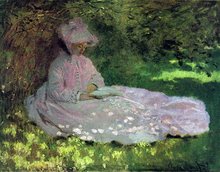I've fallen into a bad habit. I read the book and then blog on it weeks later. Fortunately, Welcome to the World, Baby Girl is one of my favorite all-time books, so I'll have better recollections of this one.
First of all, I really have enjoyed reading what you all think of this book. I read it sometimes when I am feeling lonely and want to be wrapped in the warm, comfy blanket Katie spoke of. I, too, love that little town of Elmwood Springs.
Flagg's storytelling is impeccable. It's funny. It's clever. It's fast. Her characters are well-drawn, likable, real (though slightly caricatured, the "villains" especially). Her humor runs through the book in unexpected places: the Valentines pull-over scene, for one. Aunt Elner had me in stitches all the time. Flagg also has a knack for tugging at heartstrings: the description of everyone praying for Dena when she was in the hospital built up and up until there was Aunt Elner, telling God that she didn't have anything to do and He could take her instead of Dena. Another tearful scene came when little Macky Warren had to knock on the door to tell Mrs. Nordstrom that she had a telegram, informing her of her son's death. Finally, there is Dena's own mother in the bathtub, looking for that one drop of blood. How lonely, how sad.
I guess that brings me to Dena's secret history. I sometimes skip over the chapter that describes her grandfather telling the employment agent that he has some Negro blood. I just can't stand it. I want him to take it back, to try again, to come back and give a false name. To "Apple Z" that day. It's such a petty, man-made thing. Hate. Prejudice. But, as I said, man-made. We are (wo)men. We are imperfect. Along with our prejudice and injustice there is compassion and hope. We can be the worst and we can be the best, but mostly I guess we're all just in between. Flagg just proves again without the one end of the spectrum there can not be the other.
This book is a book of contrasts. Flagg portrays her characters as almost opposites: Howard Kingsley vs. Sidney Capello, Dena and Neighbor Dorothy, to an extent. Even the setting. Neighbor Dorothy's house with its expansive back yard, her wraparound front porch, all the visitors stands in opposition to the sterility of the apartment buildings Dena grows up in.
The healing powers of this town play an enormous role in the story. When Dena is sick, she comes "home" to Missouri to become well. It's not only the slow and gentle pace of the town that cares for her. It's those warm, silly, friendly, lovable, capable people in the town, too. "Poor Tot" brings over food. Aunt Elner has stories of Dena's father, Gene. Macky offers hardware, Norma fluttering attention. These people surround Dena with all the love they had for her father, and she just soaks it all in. Her soul soaks it in. This town saves her life. Perhaps that's why I love this book so much - it feeds my soul as well as Dena's.
I'm glad you all could share this book with me.
Monday, August 18
Subscribe to:
Post Comments (Atom)

1 comment:
Danielle,
You have such a lovely, thought-provoking writing style. I always enjoy reading your reviews. Thank you for pointing out the "healing" that goes on in that town. We can all heal from the blows dealt in this world when we are surrounded by those who love us, unconditionally. Thank you for a great book choice.
Post a Comment